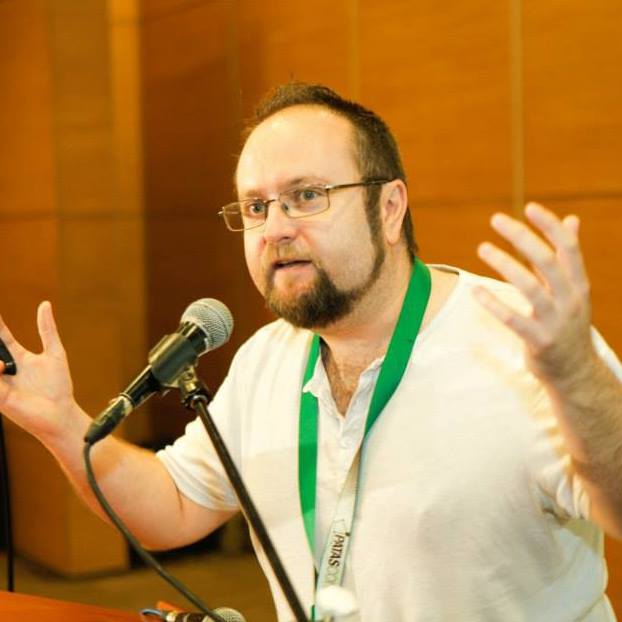The outgoing governor of Jakarta has been found guilty of blasphemy and handed a two-year prison term. It’s a signal of declining tolerance and rising militant Islamism in the world’s most populous predominantly Muslim country.

Ahok with supporters on election day
Basuki Tjahaja Purnama, popularly known by his Chinese nickname Ahok, had been a popular figure: the Christian governor of the predominantly Muslim Indonesian capital, known for his anti-corruption work and speaking truth to power.
But this changed quickly in 2016 after a “blasphemy” accusation, followed by a vitriolic campaign against him which overlapped with the 2017 election process and is thought to have toxified Ahok’s candidacy for many Muslim voters.
During a campaign trail speech on 27 September 2016, Ahok mentioned that his political opponents were using a Qur’anic verse against him, in order to discourage Muslims from voting for him, a Christian. (Surah 5:51 advises: “Do not take the Jews and the Christians as allies; some of them are allies of one another. Whoever of you allies himself with them is one of them. God does not guide the wrongdoing people.”) Though thousands of people saw the original speech, and the comment drew laughs at the time, it was interpreted by some hardline Islamic groups as an attack on the verse itself, and a doctored YouTube video supporting this version of events went viral. Several hardline Islamist groups filed a case against him, and on 13 November 2016, Ahok was formally charged with blasphemy.

Anti-blasphemy protesters mime stabbing an effigy of Ahok at a protest rally
The trial which began on 13 December 2016 concluded today, 9 May 2017 with Ahok found guilty of criminal blasphemy and incitement to violence on the same basis. He was sentenced to two years jail. While Ahok had never in fact incited violence, huge crowds of up to 500,000 people had protested against him on the streets of Jakarta before and during the trial, with some extremists calling for his execution. With a Chinese Christian background, he has also been subjected to racist and anti-Christian prejudice.
Sentencing Ahok, the presiding head judge reportedly said: “As part of a religious society, the defendant should be careful to not use words with negative connotations regarding the symbols of religions, including the religion of the defendant himself.” On the severity of the sentence, which was actually more than the suspended one-year term that prosecutors had asked for, another judge explained that: “the defendant didn’t feel guilt, the defendant’s act has caused anxiety and hurt Muslims.”
Bob Churchill, Director of Communications and Campaigns at the IHEU comments:
Bob Churchill, Director of Communications and Campaigns at the International Humanist and Ethical Union (IHEU)
“This sentence is the wail of a warning siren for a country in which intolerant Islamism is rising.
“We have seen the same pattern in states as far apart as Bangladesh and Mauritania, Pakistan and the Maldives in recent years. The pattern is that hardline Islamist groups, and violent extremists, are making more and more intolerant demands against the rights and liberties of others. They are creating and using high profile “blasphemy” incidents to whip up religious hysteria and further their intolerant agenda. And instead of being slapped down by the authorities under constitutional principles, they are instead being flattered and facilitated and given what they want.
“We call on the courts to overturn the sentence on appeal, acquit Ahok, and ensure his safety upon release. We call on the government to reconsider and abolish the country’s ‘blasphemy’ law. More than that, we call on all states suffering intolerant and militant Islamism not to make concessions, not to give in to intolerant Islamism, because every concession only creates more demands. Whereas upholding human rights and liberty is right, and will always be better for the nation in the long run.”
The Indonesian state philosophy of Pancasila, while not a perfect statement of secular democracy, has usually worked in favour of a promoting pluralism and tolerance. But the use of this religious law against Ahok, and numerous others accused of ‘blasphemy’ in the country, indicate that Pancasila’s approximation of a just and principled secularism is being incrementally abandoned.
Earlier this year, the Indonesian National Commission for Human Rights (Komnas HAM) published a report which found that ‘freedom of religion or belief’ was in decline in Indonesia. International campaign group Christian Solidarity Worldwide (CSW) also found that religious intolerance was rising as far back as 2014 in their report Indonesia: Pluralism in Peril. Responding to the sentencing today, CSW’s Benedict Rogers said: “This verdict and the sentence imposed represent an outrageous miscarriage of justice. … Indonesia’s ability to hold itself up as an example of a moderate, tolerant, Muslim-majority democracy is further threatened and is now very questionable.”
Ahok has said he will appeal the sentence.
